A new EU BON derived paper looks at the dynamics of science - policy dialogue, offering tips for improving the uptake of scientific knowledge.
Scientific knowledge is considered to be an important factor (alongside others) in environmental policy-making. However, the opportunity for environmentalists to influence policy can often occur within short, discrete time windows. Therefore, a piece of research may have a negligible or transformative policy influence depending on when it is presented.
These ‘policy windows’ are sometimes predictable, such as those dealing with conventions or legislation with a defined renewal period, but are often hard to anticipate. We describe four ways that environmentalists can respond to policy windows and increase the likelihood of knowledge uptake: 1) foresee (and create) emergent windows, 2) respond quickly to opening windows, 3) frame research in line with appropriate windows, and 4) persevere in closed windows. These categories are closely linked; efforts to enhance the incorporation of scientific knowledge into policy need to harness mechanisms within each.
In their new reseach the authors illustrate the main points with reference to nature conservation, but the principles are widely applicable. The open access paper is available here: http://www.sciencedirect.com/science/article/pii/S1462901117302095
Read also the article published on it by the British Ecological Society: http://www.britishecologicalsociety.org/windows-opportunity-influence-policy-four-tips-improve-uptake-scientific-knowledge/
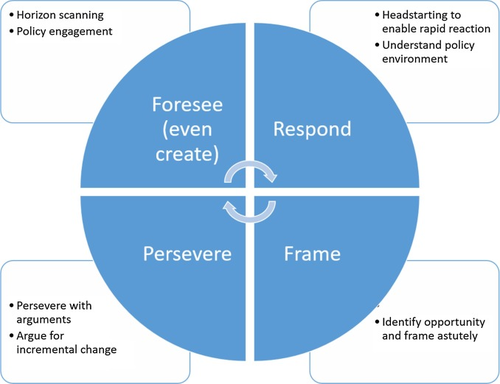
The 11th European Projects GEO Workshop took place between 19-21 June 2017, in Helsinki, Finland, bringing together European stakeholders interested in and actively contributing to the Global Earth Observations System of Systems (GEOSS).
Alongside the plenary (see presentations here), the conference featured 20 sessions looking at various aspects GEOSS, its objectives and their implementation.
Among those EU BON took part in a dedicated session titled ‘How Ecosystem and Biodiversity data and knowledge can support the GEO objectives’, alongside fellow projects and initiatives, and associated partners ECOPOTENTIAL, LTER-Europe, GLOBIS-B, EKLIPSE and ENEON.
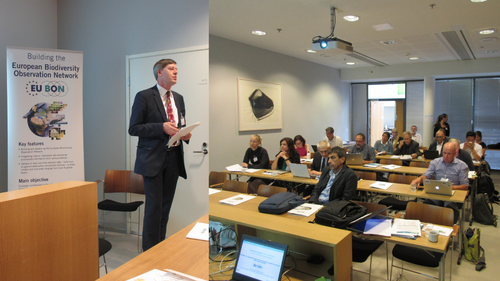
Credit: F. Wetzel
The session aimed to inform about recent developments of relevant projects that focus on Ecosystems and Biodiversity and also outline how the generated data and knowledge can support the GEO objectives and inform relevant policies on a European and global scale.
.@ft_wetzel explaining the @EUBON1 approach to mobilising linked and standardised data #EGW2017 #citizenscience #harmonisation #biodiversity pic.twitter.com/jJJ5jADAzG
— Scent (@SCENT_EU) June 20, 2017
EU BON, as a now completed project, opened the session by presenting its major products in particular the European Biodiversity Portal and how current and future projects can build on the outcomes achieved.
Overall, the session gave the opportunity to learn about the different approaches of selected EU-projects that address the mobilization, integration and analysis of biodiversity and ecosystem data, their current achievements and existing barriers. Here are some of the Key Messages that emerged from the session:
- For biodiversity and ecosystem approaches, European level efforts are needed to achieve comprehensive data coverage and full open access, especially for in situ data integration.
- Existing European-level data portals and information platforms need to be sustained and considered as integration points for national and local data hubs.
- Systematic approaches for biodiversity are needed, which means linking biotic and abiotic data and improving harmonization efforts for the whole data cycle/ workflows from data collection, analysis and dissemination for different disciplines (SBAs).
- Essential (Biodiversity) Variables (EBVs) are a key concept / framework especially for monitoring / long-term observations that should be applied for all available biodiversity/ecosystem data fields.
- Use examples from existing projects and networks as successful blueprints for bottom-up/user-driven approaches in GEOSS that relate to knowledge and user needs at the local scale.
Coming to an end, after 4.5 years of hard work and dedicated research, the FP7-funded project EU BON leaves behind a basket of results to support the Group of Earth Observations (GEO) and assist researchers in their future studies.
The EU BON website will continue to exist and host relevant information for at least the next 5 years to ensure project results are easy to access and reuse, not only by EU BON researchers, but for anyone interested in the project or working in the field.
Among the major outcomes of the project, the biodiversity portal is now complete and will be hosted for the next years by CSIC. All EU BON’s tools, products, services and the Citizen Science gateway can be found there.
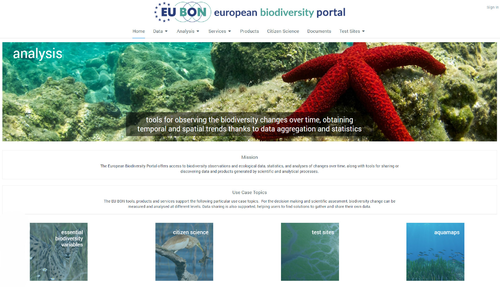
Additionally, about 15 of our tools will soon be included in the GEO BON’s BON-in-a-Box to ensure sustainability and exploitation of results.
All EU BON related publications are available via the project’s website. Moreover, important documents are also in a dedicated piloting RIO Open Science collection, demonstrating how next-generation publishing can ensure sustainability of results coming from along the research cycle, including data, guidelines, infographics and more.
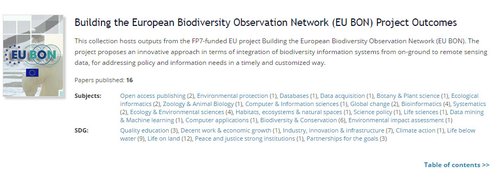
EU BON’s success could not be possible without the professional and friendly team of consortium partners and 33 associated partners, who’ve worked hard together and have contributed in various ways and with different efforts.
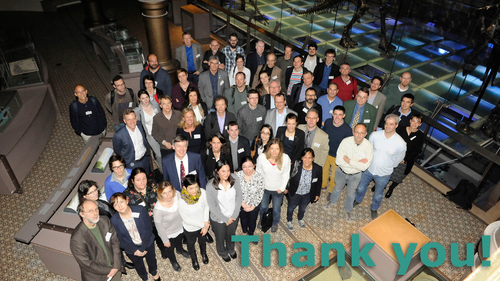
Credit: Dirk Schmeller




 RSS news
RSS news

